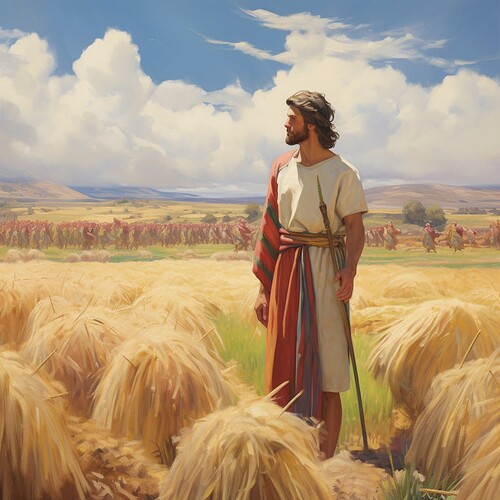![]() January 22: Genesis 37: Joseph’s Dreams and Betrayal
January 22: Genesis 37: Joseph’s Dreams and Betrayal
Navigating Dreams, Envy, and Providence
 Introduction
Introduction
Today’s journey through the Bible brings us to Genesis 37, a chapter that introduces us to Joseph, his dreams, and the resulting family conflict. This narrative sets the stage for a story of envy, betrayal, and divine providence.
 Genesis 37: Joseph and His Brothers
Genesis 37: Joseph and His Brothers
In Genesis 37, we encounter Joseph, the favored son of Jacob, who receives a coat of many colors from his father. Joseph’s dreams, which foretell his future dominance over his brothers, fuel the flames of envy and resentment.
Key Verse: “Joseph had a dream, and when he told it to his brothers, they hated him all the more.” — Genesis 37:5
 Key Themes and Reflections:
Key Themes and Reflections:
Dreams and Their Significance: Joseph’s dreams are a pivotal element, not just as prophetic messages but also as catalysts for the unfolding events.
Envy and Betrayal in Family Dynamics: The chapter vividly portrays the destructive power of envy and the consequences of betrayal within a family.
Providence and God’s Plan: Despite the unfortunate events, the narrative hints at a larger divine plan at work, one that transcends immediate circumstances.
 Today’s Application:
Today’s Application:
Reflect on how envy and misunderstanding can lead to conflict. Consider the role of forgiveness and reconciliation in healing family relationships. Ponder the ways in which difficult experiences might fit into a larger divine plan.
 Hidden Gem:
Hidden Gem:
Did you know? The coat of many colors symbolizes Jacob’s special affection for Joseph, setting the stage for the ensuing jealousy and conflict.
 Reflective Q&A:
Reflective Q&A:
![]() Genesis 37: Joseph’s Dreams
Genesis 37: Joseph’s Dreams
![]() Interpreting Dreams: What can we learn from Joseph’s experience about the interpretation and impact of dreams?
Interpreting Dreams: What can we learn from Joseph’s experience about the interpretation and impact of dreams?
A: Joseph’s story teaches us that dreams can be powerful and prophetic, yet their interpretation and the manner of sharing them can have significant consequences, both positive and negative.
![]() Family Dynamics: How does Genesis 37 challenge us to deal with envy and conflict within our own families?
Family Dynamics: How does Genesis 37 challenge us to deal with envy and conflict within our own families?
A: This chapter prompts us to examine our family relationships, encouraging us to approach conflicts with empathy, understanding, and a willingness to reconcile, despite our differences or misunderstandings.
 Join the Discussion:
Join the Discussion:
What insights do you gain from Genesis 37 about dealing with family conflicts and understanding God’s larger plan? Share your thoughts and reflections in the comments below!
#Genesis37 #Joseph #Dreams #FamilyConflict #BibleStudy #SpiritualJourney
![]() See You Tomorrow in Genesis: Stay with us as we continue to explore the intriguing and complex story of Joseph and his journey.
See You Tomorrow in Genesis: Stay with us as we continue to explore the intriguing and complex story of Joseph and his journey.
 Join the forum!
Join the forum!
Get involved in our AIgniteScripture Community for deeper insights and discussions:
Free Members: Participate in engaging conversations and access a variety of biblical resources. Sign up here: 🌟 How to Join Page - Membership Options
Supporters Membership ($20/month or $200/year): Gain access to exclusive content, personalized newsletters, and special forum privileges. Join as a Supporter: 🌟 How to Join Page - Membership Options
![]() Stay Updated with our AIgniteScripture Newsletter: Subscribe for more biblical insights: https://newsletter.aignitescripture.com/
Stay Updated with our AIgniteScripture Newsletter: Subscribe for more biblical insights: https://newsletter.aignitescripture.com/
